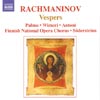Rachmaninov Vespers
Not a first choice but it is closer than most to the older Russian tradition
View record and artist detailsRecord and Artist Details
Composer or Director: Sergey Rachmaninov
Genre:
Vocal
Label: Naxos
Magazine Review Date: 12/2004
Media Format: CD or Download
Media Runtime: 54
Mastering:
Stereo
DDD
Catalogue Number: 8 555908

Tracks:
| Composition | Artist Credit |
|---|---|
| Vespers, 'All-Night Vigil' |
Sergey Rachmaninov, Composer
Eric-Olof Söderström, Conductor Erja Wimeri, Contralto (Female alto) Eugen Antoni, Tenor Finnish National Opera Chorus Raissa Palmu, Soprano Sergey Rachmaninov, Composer |
Author: Ivan Moody
This disc (previously released in Finland with the more accurate title ‘Vigilia’, the Vespers being only the first part of the work) draws in many ways upon the older Russian performance tradition. Though never reaching the dramatic extremes of the astounding 1965 account by the USSR Academic Russian Choir conducted by Shveshnikov (Harmonia Mundi, 4/85 – nla), there’s a weight to the choral sound that is at the opposite extreme from the refinement of, say, King’s College Choir. It is an operatic sound but I don’t wish to give the impression that it’s an undisciplined, vibrato-heavy reading. Erja Wimeri’s rich, plummy mezzo and Eugen Antoni’s pleading tenor have an authentic air about them, but the choir is well-controlled and blended.
There are tuning problems in some chordal passages (surprising for a Finnish choir): here something could certainly be learned from King’s. I take strong exception to the introduction of a soprano soloist into the middle of the ‘Nyne otpushchaeshi’ (Nunc dimittis), whose legitimate tenor solo is in any case almost obliterated by the choir. However, in the riveting, passionate account of ‘Bogoroditse Devo’ (‘Hail Mary’) and the excitingly fast ‘Khvalite’ (‘Praise the name of the Lord’), Söderström’s singers redeem themselves entirely.
While this would not be my first recommendation – that would be either the Corydon Singers, or, if you must have nothing but Russian, Polyansky from 1996 – it will certainly be more than interesting to collectors. It includes the full Slavonic texts in transliteration and excellent notes by Hilkka Seppälä.
There are tuning problems in some chordal passages (surprising for a Finnish choir): here something could certainly be learned from King’s. I take strong exception to the introduction of a soprano soloist into the middle of the ‘Nyne otpushchaeshi’ (Nunc dimittis), whose legitimate tenor solo is in any case almost obliterated by the choir. However, in the riveting, passionate account of ‘Bogoroditse Devo’ (‘Hail Mary’) and the excitingly fast ‘Khvalite’ (‘Praise the name of the Lord’), Söderström’s singers redeem themselves entirely.
While this would not be my first recommendation – that would be either the Corydon Singers, or, if you must have nothing but Russian, Polyansky from 1996 – it will certainly be more than interesting to collectors. It includes the full Slavonic texts in transliteration and excellent notes by Hilkka Seppälä.
Discover the world's largest classical music catalogue with Presto Music.

Gramophone Digital Club
- Digital Edition
- Digital Archive
- Reviews Database
- Full website access
From £8.75 / month
Subscribe
Gramophone Full Club
- Print Edition
- Digital Edition
- Digital Archive
- Reviews Database
- Full website access
From £11.00 / month
Subscribe
If you are a library, university or other organisation that would be interested in an institutional subscription to Gramophone please click here for further information.




